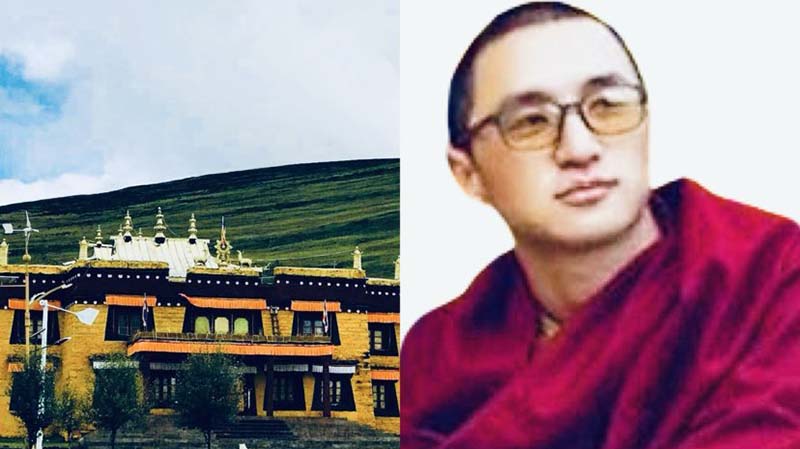Dharamshala – Chinese authorities arrested a well-educated young Tibetan monk and writer from Nyakchu County, in eastern Tibet, in September 2023 for possessing a photo of Tibet's spiritual leader, His Holiness the Dalai Lama, and several e-books in his phone. His 53-year-old mother is very worried about him and her health is deteriorating; she has been admitted to hospital.
According to a reliable source, Chinese authorities arrested Tenzin Chenrab, a well-educated young Tibetan monk and writer in September, 2023, in Dzachuka county, eastern Tibet, for possessing a photo of Tibet's spiritual leader, His Holiness the Dalai Lama, and several e-books in his phone.
" Tenzin Chenrab or known by his pen name Dhong Rangchak (ལྡོང་རང་ལྕགས), was studying at Sershul Monastery in Dzachuka County, but the Chinese authorities arrested him after Summer Retreat (དབྱར་གནས) at the monastery in late September 2023. Although there are no details about him, it was heard that he had been taken to Chengdu City, in Sichuan, China. But after more than a year, no information has been obtained about him", said the source citing information from Tibet.
The source told TPI, “He has only a mother at home, named Bhode, who is now aged 53. Tenzin Chenrab used to return home for the Tibetan New Year (Losar) to be reunited with his only family, his mother, but since his arrest, his mother has had no information about him and her health is deteriorating; she was admitted to hospital recently and, in her poor condition, she will die soon without seeing her son".
The source who knows Tenzin Chenrab said: "He has created a Wechat group and teaches people how to use the computer. He is a very talented and brilliant young monk, who has good knowledge and used to speaking on various subjects in social groups, and who expresses himself very well. He is also good in science and Chinese language. If he can continue to study well, he will surely become a good scholar. Unfortunately, the Chinese authorities arrested him. China is trying to eliminate educated Tibetans as much as it can. There used to be lots of photos of him on his social media application WeChat, but now there are no photos or posts.”
“Tenzin Chengrab once told his friend that he wrote some books and will publish them soon, but after that he was disappeared and now it has been more than one year that could not find any information about him,” the source told TPI. The Chinese authorities tightly control the flow of information from Tibet to the outside world, fearing that their oppressive policies and brutal actions will become known to the whole world.
According to the source, Tenin Chenrab studied at Wothok monastery (ཨོ་ཐོག་དགོན), at the monastery of the late Tulk Tenzin Delek Rinpoche, and then he studied at Lithang monastery (ལི་ཐང་དགོན་ཆེན) in Lithang County (ལི་ཐང་རྫོང་།). Before being arrested by the Chinese authorities, he was studying at Surshul Thekchen Dharjee Ling monastery in Dzachuka County, in eastern Tibet.
Writer Tenzin Chenrab or Dhong Rangchak used to write articles and poems, and publish them on his social networks. He is only 29 years old and comes from the lower Wothok Village (ཨོ་ཐོག་སྨད་ཐ་སྡེ་བ།) in Nyakchu County (ཉག་ཆུ་རྫོང་།), Kham region, eastern Tibet.
The summer retreat is a three-month retreat for Buddhist monks in the Tibetan tradition. It begins in summer, around July, and ends in autumn, in September. During this period, Tibetan monks cease their travels and outdoor activities to devote themselves to the study and practice of Buddhism.
China-Tibet: The one-thing you need to know
Over the past 70 decades, there has been ongoing political repression, social discrimination, economic marginalization, environmental destruction, and cultural assimilation, particularly due to Chinese migration to Tibet which is fueling intense resentment among the people of occupied Tibet.
The communist-totalitarian state of China began its invasion of Tibet in 1949, reaching complete occupation of the country in 1959. Since that time, more than 1.2 million people, 20% of the nation's population of six million, have died as a direct result of China's invasion and occupation. In addition, over 99% of Tibet's six thousand religious monasteries, temples, and shrines, have been looted or decimated resulting in the destruction of hundreds of thousands of sacred Buddhist scriptures.
Until 1949, Tibet was an independent Buddhist nation in the Himalayas which had little contact with the rest of the world. It existed as a rich cultural storehouse of the Mahayana and Vajrayana teachings of Buddhism. Religion was a unifying theme among the Tibetans -- as was their own language, literature, art, and world view developed by living at high altitudes, under harsh conditions, in a balance with their environment.


![Tibet has a rich history as a sovereign nation until the 1950s when it was invaded by China. [Photo: File]](/images/stories/Pics-2024/March/Tibet-Nation-1940s.jpg#joomlaImage://local-images/stories/Pics-2024/March/Tibet-Nation-1940s.jpg?width=1489&height=878)


















